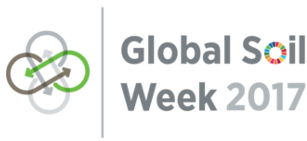![]()
Monday, 20 April 2015
Day 2: Soils in the goals and targets of the new sustainable development agenda
Organisations
ELD – Economics of Land Degradation Initiative, hosted by GIZ – Deutsche Gesellschaft für Internationale Zusammenarbeit (Germany)
ZEF – Center for Development Research (Germany)
Presentations by
Joachim von Braun (1 MB)
Ephraim Nkonya (4 MB)
Alisher Mirzabaev (1 MB)
Please download the Rapporteurs’ Report here.
Land degradation is undermining global food security and negatively affecting the livelihoods of billions of people. The consequences of land degradation are substantial and far-reaching, from reduced crop and livestock productivity and production, to huge losses in the essential ecosystem services derived from land.
Despite the critical importance of addressing land degradation, the efforts made so far have been inadequate. The global area of land degradation hotspots has increased by almost 30% since the 1980s. At the same time, land improvement through sustainable land management has only occurred in about 3% of global land area. By contrast, every dollar invested in sustainable land management was found to result, on average, in about five dollars in returns globally.
There is a lack of awareness of the high economic losses due to land degradation. In this context, the Economics of Land Degradation (ELD) Initiative aims to highlight the value of land as a crucial natural capital. ELD strives to catalyse public and private actions for sustainable land management by disseminating evidence-based research, raising awareness and building capacity. However, economic arguments alone are not always sufficient in guiding complex decision-making at various levels and in various sectors. Other instruments such as public-private partnerships and the grassroots initiatives of land users themselves need to go hand-in-hand if we are to achieve “land-degradation neutrality”.
The session seeks to explore possible ways of integrating economic arguments into decision-making processes and serves as a platform for discussion about the future actions various stakeholders must undertake to address land degradation.
Please note: part II of this session will take place on Tuesday, 21 April.
You may also be interested in the following Lunch Break Forum (LBF) contributions:
–> LBF-08: Scaling-up of best SLM practices in Ethiopia’s highlands
–> LBF-19: The atlas of large-scale land acquisition in Madagascar
Download the session description here.
Programme
Contact: Thando Tilmann

